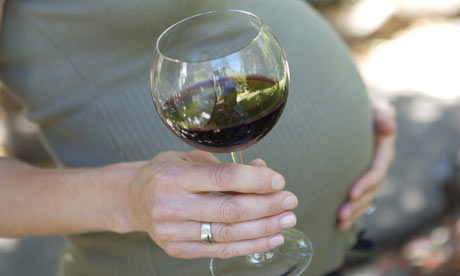
As soon as you find out you are pregnant, the thorny issue of alcohol presents itself. If you've been a regular drinker you start to worry about how much you've had while you've unknowingly been pregnant, and many people remember with dismay at least one occasion when they drank more than they should have. This is swiftly followed by concern over what you should do from now on.
Official advice, with its tendency to change over the years, has created a good deal of stress in an already emotive area - I personally find it confused and confusing still. The Department of Health (DOH) now recommends abstinence for the duration, though it wasn't that long ago that midwives were advising women to drink stout regularly to boost their iron levels. The DOH advice, which is reflected by most pregnancy websites including that of the NHS, is, in effect, 'we don't think you should drink, but if you do, please stick to a maximum of 1-2 units, once or twice a week'.
It gets muddier - this document (pdf) from the National Institute for Health and Clinical Excellence (NICE), doesn't advise total abstinence throughout the nine months. At one point, it recommends not exceeding 1-2 units once or twice a week, and in the next, advises not drinking "more than 7.5 units of alcohol on a single occasion" - couldn't this unnecessary binge drinking warning be taken to imply that drinking up to that amount is fine?
And why advise no alcohol at all? A search through the many medical research papers and reports available shows there is no evidence that small amounts of alcohol, ie within the guidelines above, will be harmful to the unborn child. It seems to me that the recommendation for total abstinence comes from the nanny state's lack of trust in pregnant women being able to stay within any guidelines. If they advocate no alcohol at all, the reasoning goes, more women are more likely to cut down. Apparently one of the reasons the government decided to err on the side of caution was in reaction to a 2007 report which found that almost one in 10 pregnant women were regularly exceeding the recommended amounts.
Despite scaremongering stories like this story in the Telegraph earlier this year which said that one drink a week could result in a mother not bonding with her baby, women do continue to drink. Perhaps this is in part due to the fact that medical practitioners often take a more realistic approach. I myself have seen four midwives so far during my pregnancy, and only one of them has recommended abstinence.
Of course, most women want to do what is right, but they just aren't convinced that an occasional drink is harmful – this, however, does not mean they don't still feel guilty about it. Polling all my immediate acquaintances, I found only one person who gave up alcohol whilst pregnant on medical advice. Among the majority who admitted to drinking, some were quite matter of fact about it in a 'what's the problem?' kind of way. Others hesitated, took furtive glances around them and lowered their voices for fear of being overheard. This wasn't because they felt they had actually done anything wrong, but because their experiences of disapprobation still upset them. A typical reaction came from an American friend: "Don't drink anything unless in the privacy of your own home with the blinds down, curtains drawn, and white noise on, lest your neighbours hear the telltale sound of a cork and beat the door down to enforce their opinion."
Attitudes in the US seem to be more hardline than they are here – I was flabbergasted to read a comment on one of my recent posts which mentioned a restaurant in New York which displayed a sign which reads "Pregnant women please do not ask our waiting staff to harm your unborn child by ordering alcohol". It's filtering down into the general populace here too - perhaps prompted by the warning labels they've seen on drinks (an image of a pregnant woman with a line through it), bar staff have refused to serve alcohol to pregnant women, and many pregnant women have experienced the humiliation and annoyance of having complete strangers berate them for drinking, treating them like chardonnay-swigging bingers, not someone having their first sip in a month. This isn't restricted to complete strangers, of course. I remember at one point being absolutely furious with one friend who offered to take me out, joking "now you're a cheap date – wine for me, pineapple juice for you."
If you do decide that the occasional drink does no harm, then what is to be your drink of choice? This is difficult in terms of other people's perception. Most people reckon a small glass of wine is acceptable, but why not a gin and tonic, which is so often deemed off limits? Surely alcohol is alcohol, and there's a strong argument that it's easier to know how much you are drinking if you have a single gin and tonic (one unit) than a glass of wine (variable alcohol content). Perhaps it's the idea that wine is usually drunk with dinner, so the food is absorbing some of the alcohol? Who knows.
People love to interfere without thought for context, but are less likely to be proactive in ways which may inconvenience them – what's the betting that the person who is vocally righteous about a pregnant woman's drinking is the same person who's unlikely to give up their seat to a pregnant woman standing on public transport?
So, shouldn't pregnant women be afforded the right to exercise personal choice when deciding whether to drink alcohol? Have you made this choice yourself? Have you ever felt the need to intervene when seeing a pregnant woman drinking, and if so, why?

